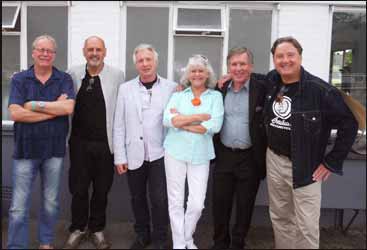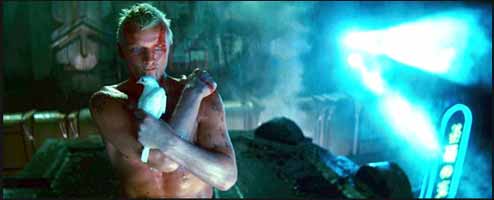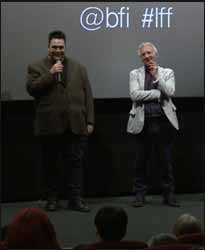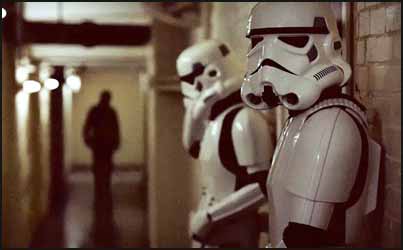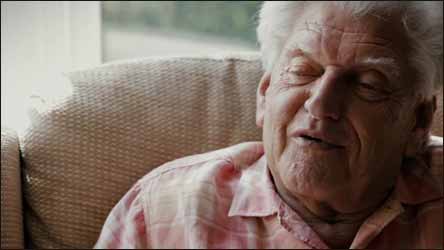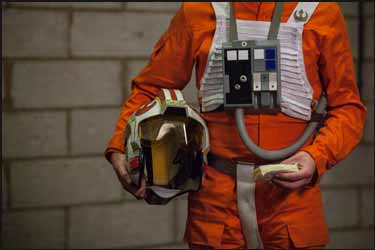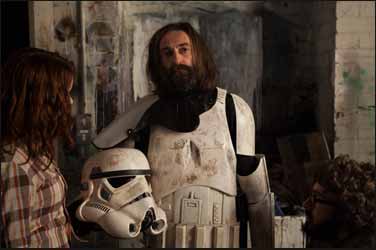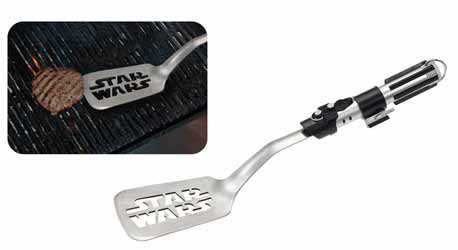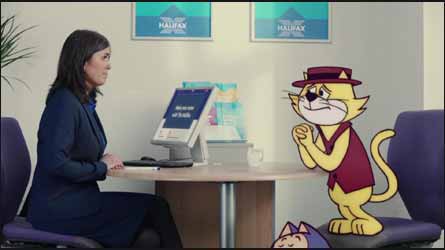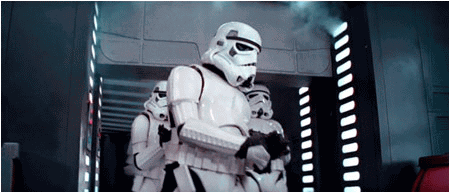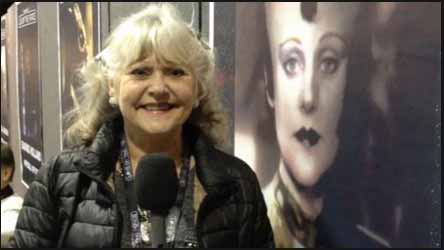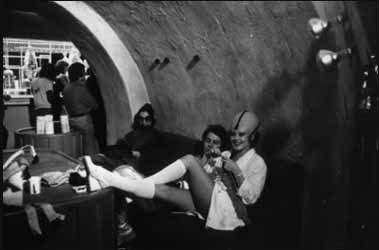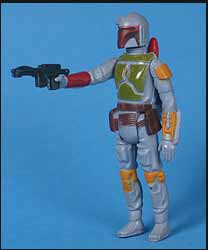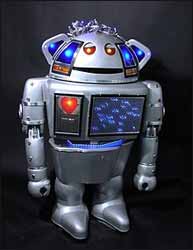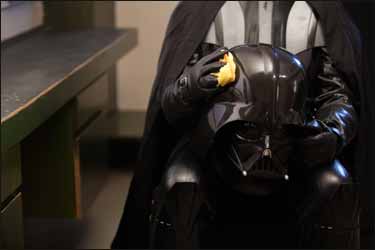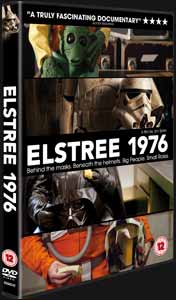|
Click here to return to the main site. Jon Spira (Director) - Elstree 1976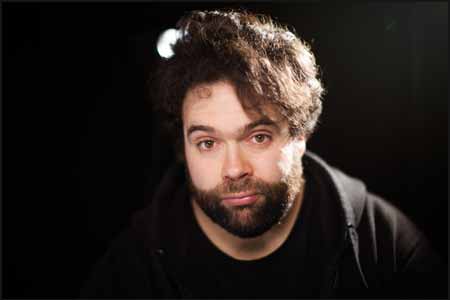 Jon Spira works at the British Film Institute (BFI) Southbank as an Audio Video Producer making documentaries that examine film culture. His 2011 independent music documentary about the music scene in Oxford, Anyone Can Play Guitar, was listed as one of the ‘20 music films you need to see’ by the NME. Spira has also worked as a screenwriter, music video director, taught filmmaking and owned and operated Videosyncratic - his own mini-chain of two independent video shops. His latest movie, Elstree 1976, interviews individuals who appeared, but had their faces obscured by either masks or heavy makeup, in the original 1977 Star Wars movie. Darren Rea spoke with him as Elstree 1976 was released on DVD... Darren Rea: Where did the idea for the movie come from? Did the original seed originate from the discovery that John Chapman, who you already knew, had been in Star Wars?
I knew Star Wars pretty well, and I just thought: "I must have missed it. There are so many characters in that film and he must have had just one line, or something." He gave me this one photo, which was in the briefing room, and he's in the middle of it and all the cast are behind him. I took it home that night and I stuck the DVD on. I got to that scene and it was shot from the other angle, so you can only see the back of his head. I realised that was all you could see of him in the film. It was only towards the end of making Elstree, when we were getting the footage in to do the rocking in and out thing, that we found that because the Blu-ray has so much more definition, that you could actually see his face for about two frames, when he stood up. And that was it. He had never even seen that, I don't think. I thought that it was weird that he had this other life signing autographs for something he'd done, literally for a day, 40 years ago. In Elstree 1976 doesn't he also talk about being one of the uniformed guards in the Throne Room scene at the end of the movie?
The original idea was to just interview actors who had been X-Wing pilots. How soon did you realise that just wasn't going to fly? Pretty quickly. Certainly that was the idea initially, because it seemed like such a tidy concept. You could do this real cross-section, because amongst the X-Wing pilots you had Mark Hamill [Luke Skywalker (Red Five)], who was obviously the biggest star of the film; you had Denis Lawson [Wedge Antilles (Red Two)], who went on to have a great career; you had character actors, like William Hootkins [Jek Tono Porkins (Red Six)]; all the way down to extras in that scene. It seemed like a really tidy way of doing a cross-section. I did actually look into that, because they've all got interesting stories and that was definitely the original concept for the film. But, after we got Garrick Hagon [Biggs Darklighter (Red Three)] we struggled. I think we tried to get Jack Klaff [John D. Branon (Red Four)] and Denis Lawson. Jack literally responded to our request about three weeks after the premier of the film [laugh]. He was just like: "Sorry. I can't believe I missed it. I'd love to be involved". Denis Lawson said: "No". We had just come off a film which we'd had to abandon because half way through shooting, half the interviewees we wanted we just couldn't get. So we were kind of very quick to go: "We've got a good crew. We're working really well right now. Let's just think what we could do." And we just thought that it made more sense to expand the remit and just say anyone who had their face obscured by a mask or a helmet - absolutely fine. And we trusted that it was going to be the interviews that led us rather than the concept, which is what it was. When you made that decision did you approach Kenny Baker, Peter Mayhew and Anthony Daniels or did you not want to go for people who were already well known?
Kenny Baker [laughs], literally told Hank to f*ck off. It was really weird. We'd just interviewed Pam Rose, and we were having a cup of tea with her and she said: "Who are you interviewing?" And we told her who we had so far. And she said: "What about Kenny Baker?" And Hank said: "Errr, well, yeah, we haven't approached him, but he'd be great". So she phoned him up and passed the phone over to Hank. Hank explained the project and Kenny Baker said: "Nah! F*ck off! I'm too old" [laughs]. David Prowse had already said no, but Pam basically said to him: "You're doing it" [laughs]. We approached Anthony Daniels and he said no. Peter Mayhew said yes, and we seemed to be on track to do an interview with him, because he was coming into the country, but then he decided he was making his own film about his knees, or something, so he wouldn't do our film. Like he suddenly announced: "No, I'm making my own documentary". It was really weird, because we were on Kickstarter, and it kind of felt like he looked up our project and thought: "Oh, I could do a film on Kickstarter." and then he went and did it. This could be completely wrong, but it just felt like it. It's just a film about his knee transplants. I don't think it ever got made. So, we didn't get him. But, like I say, we'd just come off a film that was so dependant on having certain interviewees and not being able to get half of them meant we only had half a film so we didn't even end up editing it. So, when we got onto Elstree I really didn't want to be bound by other people. I wanted to make a film which it didn't matter who the people were in it, specifically. You state, in the film's audio commentary, that you never set out to make a fan film about the making of Star Wars. This is a documentary that looks at ordinary people who had a brush with something that became a global cultural phenomenon and the film is about how that has effected them as individuals. When you were filming Anthony busking, people just walked by him not knowing or caring who he was. You stated that if those people knew he was the stormtrooper who Obi-Wan Kenobi uses his Jedi mind trick on, most people would want to stop and chat with him.
The people who identify as fans almost steal that away. It's almost like UKIP stealing it, but saying: "We're the most British" [laughs]. It is kind of a similar thing, because you feel weird saying that you're proud to be British in this day and age because that aligns you with something else. I think it's the same thing. Those kind of people have put me off saying I'm a Star Wars fan because I don't want people to think I'm like that. Even Star Trek doesn't go down to extras. It's such a weird thing, It's become this kind of critical mass and you can see people like John Chapman and Laurie [Goode] and certainly Derek [Lyons] you can see that it's actually quite harmful for them. To be pulled out of a fairly ordinary life and have a bunch of strangers tell you that you're special for something that you had such an incredibly tangential involvement in, and in the back of your mind you know that... John doesn't do a lot of conventions. The good thing about John is that at the point when he said: "I can't do this any more. I can't deal with this." That was the point where he started doing the Jonnie Rocket stuff [jonnierocket.com]. So now he has a decent reason for going to the conventions. When he goes there he's going as much as a sci-fi author as an extra... Derek would kill me for saying "extra". He's already sent me angry Facebook messages already this week for saying "extra". The synopsis for the movie, with the press information we got for the film, made it sound like you'd spent months tracking these people down. That they were living as recluses until you found them and dragged their Star Wars stories out of them. When I assume that all of them have being doing conventions for some time. Did you pay them to be interviewed at all?
Since the release of Elstree 1976, have they already seen more of an interest in them at conventions? Has it elevated them at all to the point where the price of their autographs have risen? Yeah, we're still kind of waiting to see how that works out. All of them have said that there's an increase in the number of people coming to them and talking about Elstree. I don't know if it will put them in a higher league or not. Derek went off and got a whole lot of bootleg posters made. We didn't even have posters at that point. I saw footage of him at a convention and he had a table full of Elstree poster. And I went: "Where the hell did you get those? I haven't even got a poster!" And he said: "I had them made". [Laughs] He's kind of ripping us off, actually. [Laughs]. Do you ever stop and worry that this will be the movie that you'll be remembered for? That when you're old and grey you'll make your living by doing Star Wars conventions? [Laughs] Not really. I had already been to a bunch of them before I met John. I went to the kind of fledgling UK ones when I was a teenager. I used to own two, independent video shops in Oxford, so I'd been to conventions just to pick up old toys and posters just to decorate the places with. The autograph side I hadn't really been into particularly, although I kind of got into it for the shops.
Conventions have such great guests now. I'm more of a film geek than a sci-fi or Star Wars fan, but they get these incredible, huge guests; really sort of interesting guests in a meaningful way to your childhood. I went to one six months ago and they had Rutger Hauer there. That last scene in Blade Runner is my favourite scene in cinema history, and the idea that I could just go and meet him was just, kinda, amazing. So, I have a lot of love for the conventions and when I say that "I find them sad", which I do, that's part of the reason that I love them. There's a strange kind of melancholy to it and also a strange Britishness to it. It's as if these people have seen footage of Comic Con in America and have tried to copy that, but have done it in like a really awful British way. To me it's really interesting. I really like it. I do like the conventions, but more as an observer, perhaps. As to whether I'll end up signing at them... [laughs] I don't think that will ever happen. Although we did a signing at Forbidden Planet last week, and that was very meta for me. The idea that I'm a non-famous person who is offering people autographs of a film I've made about a film of not famous people, offering people autographs... I did have a sleepless night or two before that just thinking: "It's going to be a bit Spinal Tap". But there was a queue, so that was quite nice [laughs]. It must be weird being the interviewer in the movie but now being the interviewee about being the interviewer. Of the two which do you prefer? Asking the questions or answering them?
Which do I prefer? I think everyone likes talking about themselves so being interviewed is really nice because it's really easy in that way and [laughs] you're the focus of attention... And you don't have to write it up afterwards. [Laughs] You don't have to write it up. You don't have to edit it. You don't have to have horrible, uncomfortable situations with well known actors in strange hotel rooms [Laughs]. In the audio commentary you mentioned that you were worried about making Angus appear the villain of the documentary, which I don't think you did in the film. However, the trailer, which I assume you didn't edit, really does make him come across as a little snippy.
The simple truth about trailers is... What we did was once the trailer was edited, before we released it, I sent a very long email out to all of the interviewees basically warning them about the trailer, saying: "You're not going to like it. There's no way you're going to like it. but it can only be two and a half minutes long, there are ten of you in the film, which means at best you're going to get one line or two lines and that's all it's going to be. And those lines are going to be the most exciting thing you said, even if they are out of context". So, they were warned about it. It was something that ethically I was slightly worried about, but that's what a trailer is. A trailer is a selling thing and if it works well then you bring people in to see what you are saying. That's what a trailer is. It's the most exciting lines of a film. It's kind of boiling it down to it's purest form. And, because the film is not a particularly exploitative documentary that caricatures its interviewees, it was a hard film to make a trailer for. It's a slow film, and a slightly ponderous film and its a bit melancholy. It's hard to put a trailer out for something like that, which is going to get people to want to watch it in that way. Are you still on speaking terms with all of them or were there some that weren't happy with how they were portrayed?
But Dave... We've just lost Dave really. He doesn't respond to us at all. I've got a lot of affection for him and I wish he had got more involved with the film because for all the kind of craziness of the interview he's a very hospitable guy. He's a nice guy and a funny guy and I enjoyed his company, even though it got so bizarre. I like people who are a bit off kilter. I wish he's stayed involved with the film, I really do. Has it been frustrating for you that some critics just didn't get it. That they were expecting a behind the scenes expose of what it was like to work on Star Wars?
I can always deal with people saying they don't like my stuff, because that's fine. That's opinion and personal taste, so that's not upsetting. But when someone says something you've done is rubbish, that's upsetting. They've got no frame of reference. That was the problem with this film, it falls between two very distinct posts and I've made a film aimed at people who really watch indie documentaries, who are into documentaries as a form. The film itself is a rumination on where pop culture has got to within our society. That's the point of the film. So that audience have no interest in seeing the film because it looks like a Star Wars fan film from the marketing. And the Star Wars fan base, who are desperate to see, it end up with a slow, melancholy, ponderous film of which there is only 15 minutes of real Star Wars content. So, they're furious about that. It's kind of fallen between those two posts in a really kind of weird way. Actually the overall response from Star Wars fans has been good, but you concentrate on the negative stuff.
They had now frame of reference to go: "Oh, perhaps he's playing with that. Perhaps there's a reason he's not telling us who's who in the film." It's annoying. I've let it go now. This is also the first film that I've had such a big response to. My last film came out in a very small way and generally it got reviewed by the audience that it was really intended for. It was a music documentary and it was well received. With Elstree, there's been such a huge response to it that it's kind of overwhelming. In the space of a day, even if you read ten review which generally like it, if you read four or five which don't it can really be frustrating. It's probably coming out at the most appropriate time. The world has gone Star Wars crazy this year. I know there's been a renewed interest thanks to the imminent release of the new Star Wars movie, but the merchandise is everywhere. There's even Star Wars Christmas decoration... what's all that about?
I can just about accept the things like the dressing gowns that look like Jedi robes, and the huge amount of T-shirts; if you want to step out on the street with Star Wars clothing, that's fine; if you want to buy replicas of helmets and the toys, I get it; but at what point do you step away from it? Because a f*cking spatula is just taking it too far? Are there toilet brushes? There probably are. [Editor's Note: We can confirm that Jon is now the proud owner of a Star Wars spatula (because we bought him one)]. Because we've just done a Christmas Star Wars merchandise feature I can't help but spot Star Wars products everywhere. But we were out shopping yesterday and we saw a Gillette Star Wars branded razor. There's nothing about the razor that looks different to its normal range, but there's a stormtrooper on the packaging.
The other day... oh, my god, I'm only just thinking about this now. I was in Golder's Green and there was a bank or a building society and they were using Top Cat to advertise for like f*cking mortgages and stuff. Top Cat! A Hanna Barbera character! What is wrong with our f*cking generation that even to buy a mortgage we need to see a cartoon character? If you think about it, a Gillette razor is the very notion of adulthood. There should never be a cartoon character or a children's reference on a razor blade. We've come to a really strange point with it. I was talking to my Dad about it, because I was trying to work that out and I said to him: "What were you into as a kid?" and he said: "I really liked Hopalong Cassidy". And I asked him if he'd ever now wear a Hopalong Cassidy T-shirt? And he said: "Absolutely not!" Both my grandfather and my girlfriend's dad both built their own model railways as adults. When they were kids train sets were all the rage and they spent some of their money in adulthood on their boyhood interests. Isn't that sort of the same thing?
I say that as someone who is not immune to it. Although my Star Wars fascination has certainly ebbed away, I still have bits and bobs around. Not like new action figures as such, but I have a lot of film memorabilia around - I'm not someone who is immune to it, at all. But you walk into a supermarket now and, as an adult man, you are aggressively marketed Star Wars products. It's bizarre. Did you get to the bottom of whether Laurie was the stormtrooper who bumped his head, because there are quite a few people who claim that was them - including the late Eastenders actor Michael Leader? There are two things to say about that. Firstly Laurie has always acknowledged that other people claim that. We've been doing the publicity for Elstree with him, and he'll never say: "I am the stormtrooper that banged his head". He says: "I was definitely in that shot. I definitely banged my head, but I can't prove it". Although, for the first interview, he brought his original diaries from the '70s which listed which stage he was shooting on and what he was shooting for all the things he did. He's probably got the best claim to it.
One thing he told me was that he'd always known that was him and when he saw the film he was like: "Oh, my god! They kept that shot in?!" And, when he got on the convention circuit, the first convention he did he said to the organiser: "I'll tell you a little extra something. I'm the one who banged his head." And the organiser basically said: "Join the queue". Everyone who's played a stormtrooper claims that was them. He's released a single on iTunes called 'Who Was the Stormtrooper Who Banged His Head?' Which posits it as a mystery. So yeah, it's available for download [laughs]. [Click here to download it iTunes]. Thanks for turning me onto Jaime's [Hyatt] music The Daisies were amazing. I grew up listening to them as a teenager. Family Machine is his current band. His stuff is a real grower. The more you listen to it the more depth you realise is there. They're a really amazing band. He's brilliant anyway, he's just one of my favourite musicians ever, but the rest of the band are also incredible and they all bring different things to it. So, it's incredibly rich, textured stuff. I can't interview you without bringing up Pam and her infamous ball grabbing. What's that all about?
You did. You said Hank had not yet experienced a "ball grabbing". Is that still the case? Yeah, [laughs] he still hasn't. I'm really upset that she hasn't. I'm really hoping that she's saving the best until last. I'm laughing, but it's not actually funny. If one of your male interviewers had grabbed a female member of staff's breasts... that would have been quite disturbing. You know, even though it sounds funny, there's nothing f*cking funny about it. It's genuine sexual harassment and men don't often feel that. I felt f*cking violated. It's actually not funny. It's a very violated feeling and the only reason I find it funny, subsequently, is because she got Sonny, our DP, and he really deserved it. I was there and she damn near lifted him off the ground with the shear force of the ball grabbing. He was really upset about it actually. The thing about Pam is that you've got to remember that she was best friends with Robin Askwith. She was on all the Confessions films and she was Robin's friend and personal assistant. So Pam comes from that very unreconstructed '70s point of view. She probably got grabbed constantly in that era. She really has everything straight in her head. She goes along with life like a twig on a stream. She's perfectly happy to do the conventions. She doesn't get validation from doing them, she doesn't really care. She does it because she enjoys it. She's almost the social centre for those conventions. She's the one who brings people together... By ball grabbing?
There's an hilarious photo of her grabbing Derek's balls, which is one of the best photos I've ever seen in my life. Literally the photographer caught it at the exact second that Pam had this demonic grin on her face and Derek just looks absolutely terrified [laugh]. It's interesting, the film we abandoned right before we did Elstree, was about comedians who, when alternative comedy came in, their careers got decimated by it - people like Roy "Chubby" Brown. It's really interesting talking to them about it, because sometimes culture just changes. There's just a complete seismic shift in landscape and people are just left behind. One day it's completely acceptable to make jokes about races and mother-in-laws and all of a sudden society changes its mind without explaining to these people. Our interviewees here in Elstree are in their 60s/70s, how are they supposed to know what's acceptable any more? In the film Derek talks about being transported back to his time on set simply through smelling something...
Yes, sorry. And a similar thing happened to me. The first time the Boba Fett figure appeared on the screen in Elstee 1976 I suddenly got a very strong smell of the plastic of the Boba Fett toy I had as a kid. That's the interesting side of it. That's what I'd really love to get into, the psychology of fandom. It's not just a celebration of things that we think are great, otherwise we'd be doing it with other things and fan bases would be more rabid. I can see it now, in the next generation coming up now. I was too old when Pokémon came out; that completely passed me by. But when Pokémon Go came out, people I know in their 20s were off running around the street. I think it's a literal, cultural phenomenon now. We're the first generation to have video and DVD and the Internet and what you forget is that stuff from our parents generation and above, just vanished once it was done. I took my dad to one of the conventions and they always have bootleg DVDs of stuff that's unavailable or has never been released and they had a DVD of an old TV series with Robert Shaw in it, and dad suddenly went very glassy-eyed and said: "Oh, my god! This was my favourite TV series when I was a kid". I said I'd buy it for him and he said: "No way. I don't want to see it. I've got my memories of it and it's probably going to be absolutely awful". I liked the idea that he knew where to keep that in his heart. I recently rewatched something, I can't remember what it was now, from my childhood and I was gutted to see how awful it was. And I was relaying my disappointment to one of my friends, who told me he'd learnt a few years ago to leave the past behind. One of his favourite shows from his childhood had been Robin's Nest and he was gutted when he rewatched an episode as an adult - it destroyed a bit of his childhood.
On the flip side of that, when you rewatch something that you loved as a kid and it's as good or better it's incredibly rewarding. I'm addicted to the '80s The Incredible Hulk, which towards the end was hit or miss, but when you watch that first film and the first couple of seasons of it, it's absolutely incredible. Bill Bixby was an incredible actor, it was beautifully written, it was really well directed and even Lou Ferrigno which should have been ridiculous, kind of worked. As an adult watching it now it's probably more rewarding to me than it was when I was a kid. In the audio commentary you also mentioned that as you've grown up Star Wars has become comfort viewing, that you only really watch it when you're ill lying on the sofa. You mentioned then you hadn't seen it since you'd made Elstree and you didn't know how you'd view it when you watched it next. Have you seen it since? I still haven't seen it. I don't know, it sounds kind of negative when I talk about it, but the experience of making the film has definitely put me off Star Wars. I didn't want to make a fan film. I didn't want to make a film that could be construed as a fan film, I didn't want to make a film that celebrated Star Wars, that was not ever the point of the film. In fact it was one of the things that almost stopped me from making the film, because I didn't want to be perceived in that way.
It's funny, in the time that I've been making the film I've got together with my fiance and we got engaged. Our relationship happened in the space of making Elstree 1976, and she's never seen any of the original three Star Wars films. She's seen Elstree about a million times at this point [laugh], but she does sometimes say: "Should we sit down and watch them?". And I don't know if she'd like it. There are people I know who have come to Star Wars as an adult and don't get why it's as big as it is. And it's so hard to explain your connection to it. The formula response I came up with when people were interviewing me about it early on, is for me it's like baked beans and brown corduroy and just seeing images of the the first Star Wars film reminds me of being 5 years old. There's a huge comfort level there. Do you have any plans to revisit The Empire Strikes Back and Return of the Jedi in some capacity? Watch this space.
Elstree 1976 is released on DVD by Soda Pictures on 14 November 2016 Click here to buy this on DVD - Amazon.co.uk This interview was conducted on 29 November 2016. Return to... |
|---|
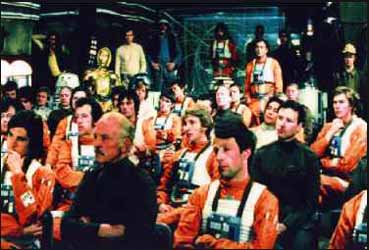
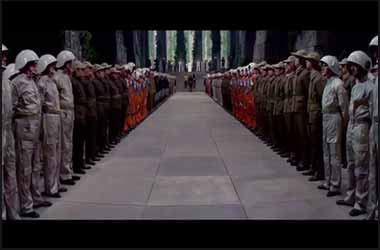
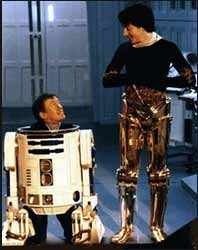
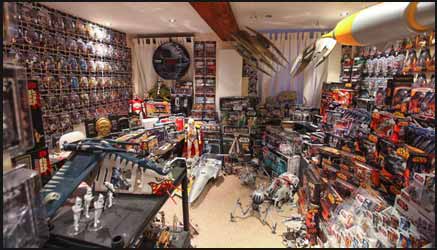 Star Wars is the only thing I can think of that is like that. Personally, I find it kind of distasteful. I love Star Wars. I love it as much as anyone our age kind of does. I grew up with it and it was everything to me when I was very young and I still have a huge, deep affection for it. But I just don't understand it. I don't understand the minutia that people are prepared to go down to as fans of it. When I say I don't understand it... to me, I have a slight distaste for it because I feel like it's almost thoughtless. I think you can be a Star Wars fan without having a house full of Star Wars crap.
Star Wars is the only thing I can think of that is like that. Personally, I find it kind of distasteful. I love Star Wars. I love it as much as anyone our age kind of does. I grew up with it and it was everything to me when I was very young and I still have a huge, deep affection for it. But I just don't understand it. I don't understand the minutia that people are prepared to go down to as fans of it. When I say I don't understand it... to me, I have a slight distaste for it because I feel like it's almost thoughtless. I think you can be a Star Wars fan without having a house full of Star Wars crap. 